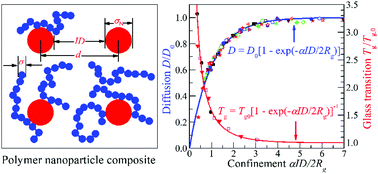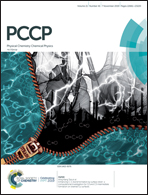Diffusivity and glass transition of polymer chains in polymer nanocomposites
Abstract
The diffusivity and glass transition of polymer chains in polymer nanocomposites are studied by using dynamic Monte Carlo simulation. Nanoparticles are modeled as immobile and distributed in a cubic lattice in the system. The diffusion coefficient D of polymer chains is reduced, while the glass transition temperature Tg is increased by nanoparticles. Our results show that the effect of nanoparticles can be summarized as D = D0[1 − exp(−α·ID/2Rg)] and Tg = Tg,0[1 − exp(−α·ID/2Rg)]−1, with D0 and Tg,0 being the diffusion coefficient and the glass transition temperature in the absence of nanoparticles, Rg the radius of gyration of polymer chains, and ID the surface spacing between nearest-neighbor nanoparticles. The parameter α that governs the dynamics of polymer chains decreases with increasing nanoparticles’ size or decreasing the temperature. Our results also show that smaller nanoparticles exert a stronger influence on the polymer dynamics at the same concentration of nanoparticles, whereas larger nanoparticles show a stronger effect at the same ID.



 Please wait while we load your content...
Please wait while we load your content...